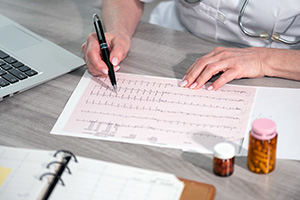Natalie Shek talks about Cardiac Science
Natalie is a 1st year Cardiac Science trainee on the Scientist Training Programme.
- Programme
- STP
- Role
- Trainee
Why did you choose job/a career in healthcare science?
I chose to pursue a career in healthcare science after working a variety of jobs, from science communicator, laboratory analyst to clinical support worker, and realising what I value and enjoy from work aligns the most with the role of a healthcare scientist. I enjoy interacting with lots of people from different backgrounds and helping others on a one-to-one basis. I am also interested in developing my clinical and scientific skills and knowledge, and care about human health and wellbeing. Thus, I applied to train as a clinical cardiac scientist through the Scientist Training Programme (STP) because it is a patient-facing role, involves being a part of a team of healthcare professionals and investigating the impact of heart disease which I consider an important and fascinating aspect of healthcare.
What does a typical day involve?
It is difficult to describe specifically what my typical day would be as a first year STP cardiac science trainee because I am currently experiencing so many new and different learning opportunities from rotating into two other departments related to cardiac science, namely vascular investigations and respiratory and sleep science. In my own department of cardiac investigations, a representative day so far perhaps consisted of performing electrocardiography (ECG), setting up and fitting cardiac and blood pressure monitors for patients at the outpatient clinic and on the wards. I have also been learning to analyse and report ambulatory ECG recordings with colleagues and shadowing a range of clinics and procedures done within and outside of the department to gain the necessary breadth and depth of skills and knowledge to demonstrate my competencies for my online training portfolio.
How does your job impact on patient health?
The role of a cardiac clinical scientist requires assessing, analysing, reporting on the condition of a patient’s heart, whether it be from interpreting an ambulatory ECG recording, an ultrasound-generated image or when a patient requires monitoring during a procedure such as an angiogram or angioplasty. Therefore, as I progress and develop further throughout my training, I would be responsible for providing useful, important and essential information that contributes to the patient pathway at various stages including for diagnosis, considering appropriate treatment options, pre- and post-operative assessment and disease monitoring.
What would you say to someone thinking about a career in healthcare science?
Consider a career in healthcare science if you are curious about learning and applying scientific skills and knowledge in a clinical setting to help patients. There are many different fields of healthcare science too ranging from medical physics, histopathology to genomic counselling, so some specialties may pique your interests and fit your personality more than others. I personally find a career in healthcare science very fulfilling, intriguing and rewarding. It is worth trying to research more to find out if this also appeals to you by contacting people from a particular professional field or department, seeking opportunities of work experience, departmental visits or volunteering, and attending careers events.
